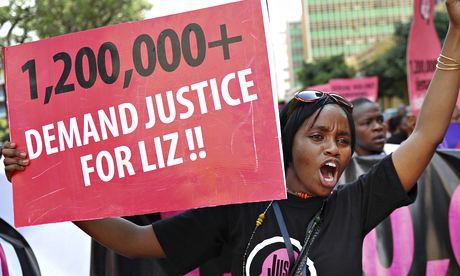Human Rights of Women
Progress on gender equality is being eroded by new laws that violate the constitution and indoctrinate discrimination. News of the death of a 13-year-old girl from Kajiado in southern Kenyaafter she underwent female genital mutilation (FGM) brings to mind another 12-year-old Maasai girl, Sasiano Nchoe, who died in very similar circumstances after undergoing FGM in 2008.
Sasiano was buried but her body was exhumed after Equality Now'spartner, the Tasaru Ntomonok Initiative, became involved and alerted the authorities. As a result of the autopsy, both Sasiano's father and the person who carried out the crime were arrested and charged with manslaughter. However, delays ensued and it was only after a campaign to get police to implement the country's 2001 anti-FGM law that the trial proceeded and the accused were convicted.
In the latest case, the police responded much more quickly and launched a search for the girl's guardian, and the person who had allegedly carried out the mutilation, within a matter of days. Can we assume that Kenya's justice system is finally dealing with FGM with appropriate urgency?
The 2013 report on FGM prevalence trends, published by the UN children's fund, indicates that progress has been made. Kenya is cited as a "leading light", with the biggest decrease in prevalence out of all countries analysed. The country's relative success in dealing with FGM can largely be credited to its implementation of a combination of legislative, educational and child protection approaches.
Since then, further progress has been made; under pressure from activists, Kenya expedited the creation of an anti-FGM board under former minister Linah Jebii Kilimo in late 2013. More recently, the director of public prosecution (DPP), Keriako Tobiko, spearheaded theroll-out of an anti-FGM prosecution unit to locations of high FGM prevalence. The key aims of that initiative are to collect information, establish partnerships and sensitise communities to ensure the existing law is implemented effectively.
 Women's rights campaigners are still waiting for justice for 'Liz', a teenager who was gang-raped in June 2013 in rural western Kenya. Photograph: Str/AP
Women's rights campaigners are still waiting for justice for 'Liz', a teenager who was gang-raped in June 2013 in rural western Kenya. Photograph: Str/AP
However, although systems are being slowly put into place, implementation of the FGM law continues to be patchy at best, with delays the norm. The justice system clearly failed to protect the young girl in Kajiado, and it continues to fail other girls and women –particularly in cases of sexual violence.
Liz, a 16-year-old rape survivor is still waiting for justice despite the fact that the office of the DPP initially issued public assurances that her high-profile case would proceed to court without further delay. Last week, the DPP confirmed that the trial will not take place until 24 June.
Liz's case came on the heels of a landmark judgment for victims of sexual violence passed by the Kenyan high court in May 2013 in a class action suit, known as the 160 Girls Case, on behalf of girls whose cases of sexual violence had been mishandled by the police. The court held that "the neglect, omission, refusal and/or failure of the police to conduct prompt, effective, proper and professional investigations" into the many complaints of sexual violence violated the girls' fundamental rights and freedoms, and ordered the commissioner and inspector general of police to conduct "prompt, effective, proper and professional investigations".
However, implementation of the law is not the only issue affecting women and girls' rights in Kenya. New laws are being enacted which indoctrinate discrimination and violence and which threaten the hard-earned advances that have been made on gender equality.
Early this year, MPs voted in favour of a new Matrimonial Property Act, which strips women of their rights to family property, including the homes where they and their children live, if they are unable to prove they make a financial contribution.
Unfortunately, the troubling legislative trend did not end there. In March, a new marriage bill was voted on, which would formally permit polygamy but which omits the cultural context that permitted first wives to veto a husband's choice. The bill is awaiting the presidential assent before becoming law.
These two pieces of legislation are in clear violation of the 2010 constitution. They also violate the African women's rights protocol, also known as the Maputo protocol, which Kenya has ratified, as well as various other national, regional and international legal instruments. Furthermore, they send the message that although the country is making progress in certain areas, overall the rights of women and girls are not being adequately protected or promoted.
If it chooses, Kenya can take a lead in Africa on gender equality, but it needs to be much more consistent in its legislative policy and it must deter from enacting harmful discriminatory laws that ignore previous commitments.
In the African Women's Decade, we should focus not only on ending all forms of violence and discrimination against women and girls in Kenya, but on being proactive about making the country a more just society for all. This will take true leadership and an abundance of political will, and we hope that Kenya has the guts to make this leap.
• Faiza Jama Mohamed is the Nairobi director of Equality Now, which acts as the secretariat of the Solidarity for African Women's Rights (Soawr) coalition of 44 organisations.
